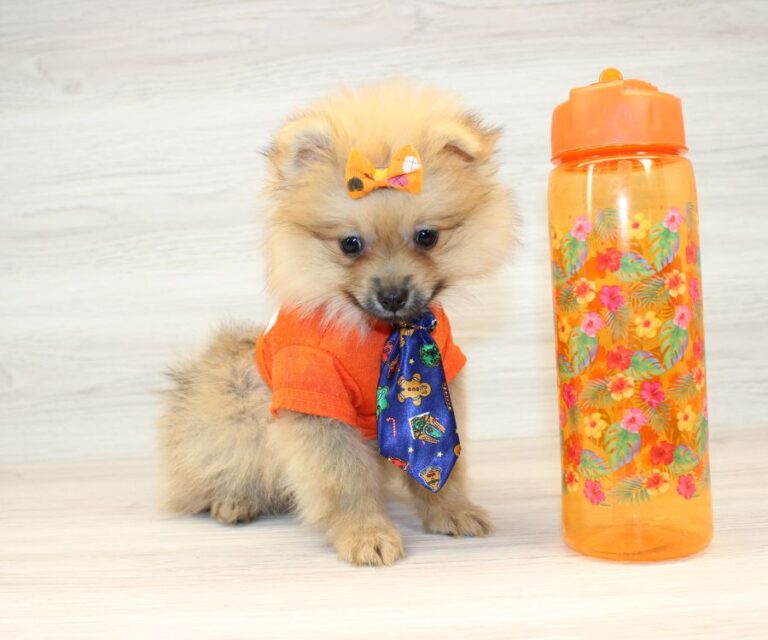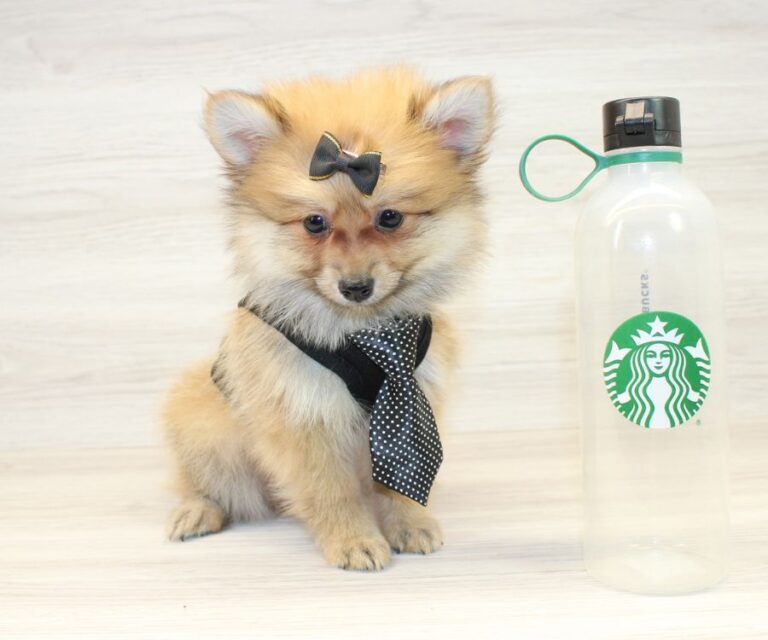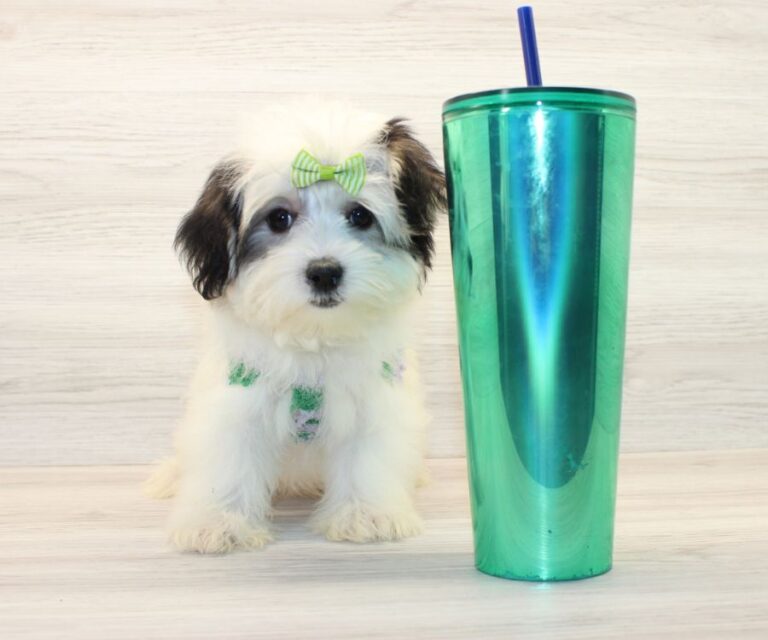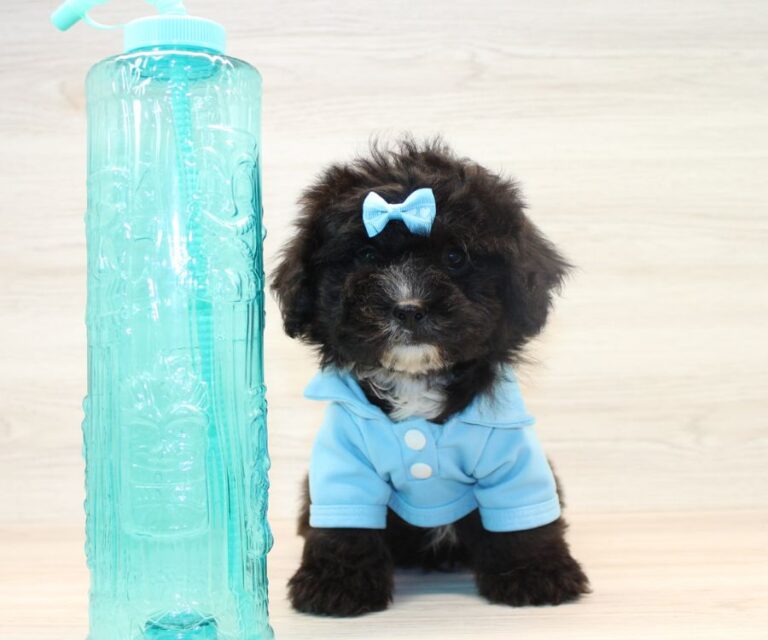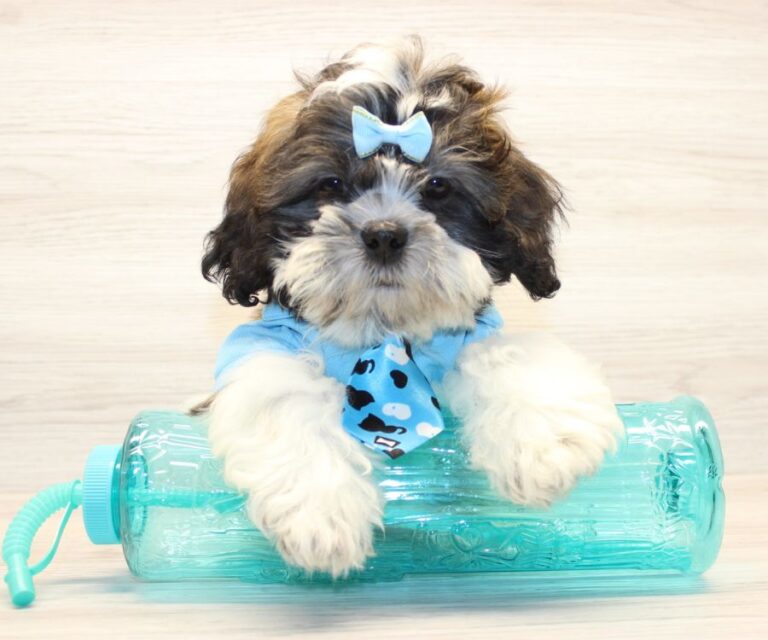You’re in luck if you’re seeking toy and teacup puppies for sale in Herkimer, NY! Puppyheaven.com offers a beautiful range of these small and lovable puppies, each raised with strict health and breeding standards to make sure they’re ready for a happy, healthy life in your home. These tiny companions are perfect for apartment living, are known for their vibrant personalities, and provide invaluable emotional support. From Chihuahuas to Yorkshire Terriers, you’ll find the ideal new furry friend. Proper care, including nutrition and regular vet visits, is essential. Learn how Puppyheaven prepares each puppy for a successful adoption.
Why Choose Toy & Teacup Puppies?
Choosing toy and teacup puppies can bring immense joy and companionship into your life, offering a unique blend of affection and convenience due to their small size. When you’re considering adding a new member to your family, size management is an essential aspect, especially if you live in a smaller space or require a pet that’s easier to handle physically. These petite canines fit comfortably into compact living situations, making them ideal for apartment dwellers or those with limited mobility who might find a larger dog challenging.
Additionally, breed popularity plays a significant role in your decision. Certain toy and teacup breeds, like Chihuahuas, Pomeranians, and Yorkshire Terriers, aren’t only highly sought after for their charming appearances but are also known for their vibrant personalities and loyalty. This popularity offers a wide community of fellow owners and ample resources for care and training advice, which can be incredibly beneficial, especially if you’re a first-time dog owner.
Health Benefits of Small Dogs
You’ll find that owning a toy or teacup puppy not only boosts your emotional well-being but also encourages a more active lifestyle.
These small dogs require regular play and exercise, which gets you moving and enhances your overall health.
Their companionship can greatly lessen feelings of loneliness and stress, providing a unique form of emotional support.
Enhances Emotional Well-being
Owning a small dog can greatly enhance your emotional well-being, offering companionship and reducing feelings of loneliness and stress. The presence of a tiny, joyful companion can greatly uplift your mood and bring a sense of peace to your daily life.
Here are some key benefits:
- Companion Joy: Experiencing the unconditional love from a small dog adds joy and fulfillment to your life.
- Stress Reduction: The soothing presence of a pet can decrease anxiety and promote relaxation.
- Enhanced Social Interaction: Small dogs often attract attention and encourage interactions, helping you connect with others.
- Emotional Support: They provide comfort and support, easing symptoms of depression and boosting your overall spirit.
Embrace the loving impact a small dog can have on your emotional health.
Promotes Active Lifestyle
Small dogs can have a significant impact on your physical health by encouraging you to maintain an active lifestyle. Regular walks and playtime with your pet not only help you stay fit but also deepen the bond between you and your furry companion. By integrating fitness tracking tools, you can set health goals and monitor progress for both you and your small dog, fostering a sense of accountability and motivation to stick to your exercise routines.
Consistent physical activity not only promotes longevity and well-being but also reduces the risk of chronic diseases. Embrace the opportunity to improve your health and your furry friend’s well-being by staying active together.
Puppyheaven’s Breeding Standards
Puppyheaven follows strict breeding standards to guarantee the health and well-being of their toy and teacup puppies. Adhering to the highest breeding ethics, they make sure that every puppy comes from a background that promotes genetic diversity, reducing health risks associated with inbreeding.
Puppyheaven’s commitment extends to various critical areas:
- Health Screening: All breeding dogs undergo thorough health checks to detect any hereditary conditions that might affect puppies.
- Living Conditions: Breeders provide a clean, nurturing environment that allows dogs to thrive physically and emotionally.
- Breeder Education: Ongoing education on the latest veterinary practices ensures breeders are well-informed and equipped to care for their dogs.
- Ethical Breeding Practices: Strict guidelines to prevent overbreeding and ensure the mothers receive proper care and recovery time between litters.
You’ll find that Puppyheaven’s approach isn’t just about breeding; it’s about creating a responsible, sustainable community that enhances the lives of both puppies and their future owners. By choosing Puppyheaven, you’re not just getting a pet; you’re supporting a system that values animal welfare and responsible pet ownership.
Preparing for Your New Puppy
As you prepare to welcome your new puppy into your home, it’s crucial to equip yourself with the right tools and knowledge.
You’ll need to create a checklist of puppy essentials, make sure your home is safe for a small pet, and understand the best practices for your puppy’s first vet visit.
These steps will help guarantee a smooth changeover for both you and your new companion.
Puppy Essentials Checklist
Before your new puppy arrives, you’ll need to gather several essential items to guarantee their comfort and safety. Puppy bedding should be cozy and washable, offering a secure space for your puppy to rest.
Establishing a regular feeding schedule is also important for their health and well-being. Here’s what you should have on hand:
- Comfortable bedding: Provide a soft, warm place for your puppy to sleep.
- Food and water bowls: Choose durable, easy-to-clean dishes.
- High-quality puppy food: Consult your vet for recommendations based on breed and size.
- Chew toys: Help soothe teething and keep them engaged.
Home Safety Measures
Once you’ve gathered all the necessary supplies, it’s important to ensure your home is a safe environment for your new puppy. Begin by identifying and securing any household toxins, including cleaning agents, pesticides, and certain plants that can be harmful if ingested. Store these safely out of reach.
Next, inspect your yard for escape routes and gaps in fencing. Ensuring secure fencing not only prevents your puppy from wandering off but also protects them from external dangers. Consider covering electrical outlets and securing loose wires to prevent any chewing accidents.
First Vet Visit Tips
Scheduling your puppy’s first vet visit soon after bringing them home is crucial for their health and well-being. This initial appointment isn’t just about starting their vaccination schedule; it’s also a prime opportunity for a thorough health and behavioral assessment. Here’s what you should make sure to cover:
- Vaccination Schedule: Discuss and set up the appropriate vaccinations needed for your puppy’s age and future health.
- Behavioral Assessment: Have your vet evaluate your puppy’s behavior to identify any early signs of anxiety or aggression.
- General Health Check: This includes weight, heart, lungs, eyes, and ears examination.
- Preventive Recommendations: Get advice on flea, tick prevention, and other wellness tips to keep your puppy thriving.
Training Tips for Small Breeds
Training small breed puppies requires patience and consistency, as they often need clear, gentle guidance to thrive. When addressing the critical areas of potty training and behavioral correction, you must establish routines that your puppy can predict and follow.
Start potty training immediately by taking your puppy to the same spot each time and rewarding them for successful elimination. This reinforces good habits and helps prevent accidents indoors.
Behavioral correction for small breeds should be approached with compassion. Instead of harsh reprimands, use positive reinforcement techniques. Reward desired behaviors with treats, praise, or playtime, ensuring that your puppy understands what actions are pleasing to you. If you need to discourage a behavior, opt for a firm ‘no’ and redirect their attention to a more appropriate activity. Remember, consistency is key—mixed signals can confuse your puppy.
Always keep training sessions short and enjoyable. Small breeds can have short attention spans, and prolonged sessions might lead to frustration on both sides. Aim for multiple five-minute sessions spread throughout the day instead of a single long session. This breaks down the learning process into manageable chunks and keeps their engagement high.
With dedication and understanding, you’ll build a lasting bond based on mutual respect and love.
Puppy Nutrition and Care
While focusing on your puppy’s behavior and training, it’s equally important to pay attention to their nutritional needs and overall care. Proper nutrition and vigilant care are vital, especially for toy and teacup puppies, whose small size can make them more susceptible to certain health issues.
Here are some key aspects to take into account in puppy nutrition and care:
Establish regular feeding schedules: Consistency helps regulate their metabolism and supports steady growth. Plan small, frequent meals to sustain energy levels without overburdening their tiny digestive systems.
Choose the right puppy food: Look for high-quality foods that are specifically formulated for small breed puppies. These products usually have higher protein and fat content suitable for their energetic needs.
Monitor for food allergies: Be observant of signs of allergies, such as itching, digestive upset, or lethargy. Allergy management involves identifying and eliminating allergens from their diet, which might require consultation with a vet.
Hydration is key: Make sure they’ve constant access to fresh water, as proper hydration is essential for their overall health.
Your dedication to providing the best care and nutrition will help your tiny companion thrive, fostering a healthy and joyful life together.
Common Health Concerns
As you consider bringing a toy or teacup puppy into your home, it’s important to be aware of their common health concerns. These tiny breeds often face genetic health issues, dental care challenges, and may require frequent veterinary visits to maintain their well-being.
Understanding these aspects can help you provide the best care for your new furry friend.
Genetic Health Issues
Due to their small size, toy and teacup puppies often face a range of genetic health issues, including heart defects and respiratory problems. Understanding the inheritance patterns and breeding ethics can help mitigate these concerns:
- Heart Defects: Conditions like patent ductus arteriosus are more prevalent in these small breeds.
- Respiratory Issues: Challenges such as collapsed trachea can arise due to their diminutive windpipes.
- Liver Shunts: A common issue where blood bypasses the liver, affecting detoxification.
- Hypoglycemia: Their small body mass can lead to dangerously low blood sugar levels.
It’s crucial you’re aware of these risks to provide the best care for these tiny companions, emphasizing the need for responsible breeding practices.
Dental Care Challenges
Toy and teacup puppies often face important dental care challenges due to their tiny mouths and overcrowded teeth. This can impede proper tooth development, making them more susceptible to dental diseases.
As a responsible owner, it’s important you implement effective brushing techniques early on. Start by gently brushing their teeth with a size-appropriate, soft-bristled toothbrush and a vet-approved toothpaste. Daily brushing helps remove plaque and prevents tartar buildup, greatly reducing the risk of periodontal disease.
Be patient and consistent. Reward your puppy after each session to make it a positive experience. Remember, caring for their dental health isn’t just about aesthetics; it’s essential for their overall well-being.
Your dedication to their dental care is a crucial part of their health regimen.
Frequent Veterinary Visits
Regular veterinary check-ups are vital for identifying and managing the myriad health concerns that toy and teacup puppies often face. You’ll need to be proactive in scheduling these visits to guarantee your puppy’s long-term health and happiness.
Here are key aspects to focus on during these visits:
- Vaccination Schedule: Keeping up with vaccinations is essential to prevent common infectious diseases.
- Emergency Care: Know the signs that indicate your puppy needs immediate attention.
- Nutritional Advice: Receive tailored feeding guidelines to support their delicate health.
- General Monitoring: Track growth and developmental milestones, watching for any signs of distress.
Socializing Your Teacup Puppy
Socializing your teacup puppy early on helps them develop into well-adjusted, confident adult dogs. It’s vital to introduce your little companion to a variety of experiences, people, and other animals in a controlled, positive manner. Puppy playdates are a fantastic way to start. These gatherings allow your puppy to interact with other dogs in a safe environment, learning important social cues and behaviors. Remember, it’s not just about playing; it’s about setting the foundation for future interactions.
Behavior reinforcement during these early stages is critical. Always use positive reinforcement techniques such as treats, praise, and gentle guidance to reward good behavior. This not only encourages your puppy to behave appropriately but also helps strengthen the bond between you. Avoid negative reinforcement that could instill fear or anxiety, as teacup breeds can be particularly sensitive.
Be patient and consistent. Socialization isn’t a one-time event but a continuous process that plays a pivotal role in your puppy’s development. By taking the time to carefully socialize your teacup puppy, you’re ensuring they grow up to be sociable, well-mannered adults, ready to confidently face the world. Your efforts will shape them into not just pets, but lifelong, loving companions.
Finding the Right Veterinarian
After guaranteeing your teacup puppy is well-socialized, it’s important to find a veterinarian who understands the unique needs of smaller breeds. These tiny pups require specialized care that not all vets may be equipped to provide, so choosing the right one is essential for your new pet’s health and happiness.
When searching for a vet, consider the following:
- Experience with Teacup Breeds: Look for a veterinarian with specific experience in handling teacup and toy breeds. Their delicate structures and unique health issues demand expert care.
- Availability of Emergency Services: Ensure the clinic offers emergency services. Teacup puppies can face sudden health issues that require immediate attention.
- Transparent Veterinary Costs: Inquire about the cost structure upfront. Veterinary costs can vary widely, and it’s important to find a service that fits your budget without compromising on the quality of care.
- Positive Client Feedback: Check reviews and ask for recommendations from other teacup puppy owners. Positive experiences from others can be a good indicator of reliable and compassionate care.
Finding the right vet involves more than just checking qualifications. It’s about making sure they’ve a gentle touch and a deep understanding of what your tiny companion needs to thrive.
Successful Adoption Stories
Many families have shared heartwarming tales of how adopting a teacup puppy from Herkimer, NY, transformed their lives. You might find yourself inspired by the story of the Thompson family, who attended one of the local adoption events and met Bella, a shy teacup Yorkie. Her arrival brought a new sense of joy and companionship to their home, fostering a deep bond that only grew with each passing day.
Your experience could mirror that of the Johnsons, who decided to foster a teacup poodle before making a permanent commitment. This foster experience revealed not only the puppy’s delightful quirks but also highlighted the profound emotional support these pets provide. Ultimately, they couldn’t part with their furry friend and officially adopted him.
As you consider attending an adoption event or engaging in a foster experience, remember the significant impact you can have on a puppy’s life. It’s not just about saving a life; it’s about enriching yours as well. These puppies often come from situations that require tender love and care, and by choosing to adopt, you’re also contributing to a greater cause—reducing the burden on local shelters and giving these animals a second chance at happiness.
Conclusion
You’re making a wonderful choice with a toy or teacup puppy from Puppyheaven! Remember, these small breeds require specific care, so always adhere to best breeding standards and prepare diligently.
Training and socializing your new friend are important for a healthy, happy life. Keep an eye on common health concerns and choose the right veterinarian to make sure your puppy thrives.
Embrace the joy and companionship your new puppy will bring into your life.



